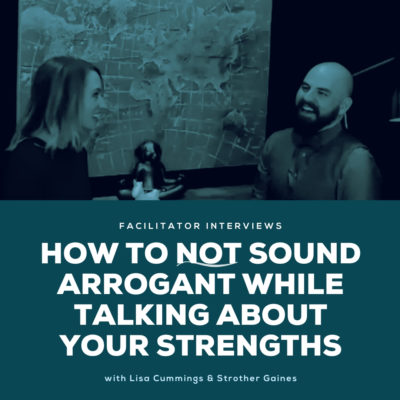How To Not Sound Arrogant When Building A Career Brand Around Your Strengths
Podcast: Play in new window
Subscribe: Spotify | iHeartRadio | Email | TuneIn | More

Lead Through Strengths Facilitator Strother Gaines Shares His Thoughts On How To Not Sound Arrogant When You Offer Out Your Strengths
In this episode, Lisa Cummings and co-host Strother Gaines talk about the different ways you can present or offer your strengths at work and how to not sound arrogant in doing so.
How you can be received or appreciated for your contribution at work depends on how you are able to maintain that delicate balance between wanting to be known for your strengths and not coming off as full of yourself.
Customers come to us every day feeling excited about their StrengthsFinder results, yet simultaneously being afraid of turning everyone off. They want to know how to not sound arrogant or bratty or braggadocios when they try to get known for their top talents.
Here's the transcript of the interview with Lisa and Strother Gaines as they explore the topic:
Lisa: You're listening to Lead Through Strengths, where you'll learn to apply your greatest strengths at work. I'm your host, Lisa Cummings, and I'm also back with my co-host Strother Gaines, where we are talking about that situation where you want to build a personal brand or a career brand around your strengths, but then you're worried because you don't want to sound like a jerk and you don't want to sound like you're walking around the office saying —
“I am really good at these things. So assign me these things.”
So it gets a little precarious because you want to be known for it, but you have to figure out how to talk about it without turning everyone off around you. Basically, you'll want to practice talking about your awesomeness while also balancing how to not sound arrogant when you bring them up. So I won't keep you waiting any longer.
Here's my conversation with Strother, one of our Lead Through Strengths facilitators, talking about how to navigate this tough situation.
Wanting To Toot Your Own Horn? Learn How To Not Sound Arrogant With It
Lisa: Imagine the tall poppy syndrome that you've heard of, or "the nail that stands up gets hammered down." All of the things that say, “No, you need to be humble. You should keep it to yourself and make sure that you're a very humble person.”
But then at the same time, how can you make your differences your differentiators if you're not willing to experiment with them and let them out?
So what does it look like to not be tooting your horn in a way that's obnoxious but you're actually offering them out as a contribution? How do you even begin to figure out what is what?
Strother: So in the South, it's called “getting too big for your britches.” It’s what we would say. And I got a lot of that actually leaving Kentucky when I left because people are like —
“Well, you're abandoning everyone and you're leaving these things and you need to come back and do the thing that everybody does.” For some people, that's actually really rewarding to be a part of that.
Consistency is my last strength in my report, and I don't like to repeatedly do the same thing. But for someone, if that's your strength, live in it. Someone needs to be able to do it.
Tooting your own horn, when it comes from a place of, “This is my contribution. This is what I can give, and this is how I'm going to help the situation,” as opposed to, if I frame it in, “Look at me. Look at me. Look at me!” — it does come off like, “You're a jerk!”
Definitely, no one wants to work with that guy.
But when I frame it in, “If you'd like to leverage me appropriately, and you'd like to see me do my best work, putting me in this scenario, giving me an opportunity to do this specific thing, which is something that lots of people don't like to do...”
It's when I think about public speaking. So many people are terrified of it. And I would so much... Excel Sheet versus Public Speaking? Throw me up on the stage!
So it's finding where you have those natural fits and just making it accessible to the people that you collaborate with, giving them the option rather than demanding that they do your thing. If you've been fretting about how to not sound arrogant when you talk about your skills and talents at work, the solution is all about offering them as a contribution rather than framing it as a selfish need to let them out.
Offer Your Strengths And Contribution Rather Than Imposing It
Lisa: Oh, that's so powerful also to imagine like if I'm imposing my supposed strength on you, it doesn't feel like a strength when you're doing that. But if it's offering a contribution, how could they even know to use that in you, if they didn't know that you were interested in that?
That means you have to play with it a little bit to offer that contribution out, or that no one would ever know that you would be the one who would love to get the presentation so that they can go live and excel where they would prefer.
Strother: Because people will use their lens. That is something that we're all guilty of. It’s me assuming —
“Well, everyone's gonna want to be on stage.”
"That one's a little easier, because I know many people hate that..."
But we always have this frame of —
“Well, I like it, so wouldn't the people that I work with also want that opportunity?”
And the answer is most often, “No."
My playwright and I are very different. And I'm very much like, "Let's process it out loud..." I want to like, brainstorm. And we'll write all the things on the wall and kill 100 of them but one thing will rise up.
And, Jenny is very much the person who's like, “I want to go back to my writer cave. I'm going to go away for a really long time.”
And that's a push-pull for us. It’s figuring out “how long is enough?” Like, when do we need to expose to the performers?
But that is just part of her process. And so if I assume she wants to work the way I want, or if she assumes that I want to work the way she wants, we're both going to be unhappy.
So giving everyone the space to offer their thing rather than demand, I think, is really important in a good culture. This is also a key piece when you want to know how to not sound arrogant. If you give them space to offer their thing, they're also likely to give you space to make your best contributions too. Then you don't have to do so much tooting of your horn - it becomes a pull rather than a push.
How Looking For Ways To Offer Your Strengths Can Lead To Your Best At Work
Lisa: Isn't it cool how Strother took this concept of offer and just made it practical? I love the concept of trying to not feel arrogant when you're offering your strengths out. And you could do the same thing with this concept of "offer." If you walked around kind of in the arrogant way and you were like —
“Who wants some of this? I got some Includer for you..."
"You want some of this? Here's some Deliberative... Look at this risk that you're ignoring...”
Now that would be a way to offer it that wouldn't be received well, and someone might think that you are sounding arrogant in the way that you're offering up how you see things that others can't see.
But if you think of a genuine offer of contribution, this is what Strother is talking about. He's talking about on the inside, can you be looking around during a given workweek and thinking —
“How can I offer this to someone? How could I be helpful with this? How can I make a contribution to this team with this thing?”
And the beauty is, if you're looking for those offers, you're looking for ways that you can help by using the strength or natural talent that you have, then naturally, you're going to get known for those talent themes. And naturally, you're going to begin to get work assigned to you that aligns with them.
And that is when you really begin to feel like you are living out your best at work. You don't have to fret about how to not sound arrogant because it all works gracefully.
With that you've been listening to Lead Through Strengths, where you'll learn to apply your greatest strengths at work. If you've been totally digging Strother in this interview series, feel free to request him when you bring us in for a CliftonStrengths training. He does both in-person and, of course, the ever-popular virtual training with teams. We will be stoked to assign him to your event if he has resonated with you during this series.
So with that, we will see you next time as we explore StrengthsFinder from a different work angle.
Next up, we will be talking about conflict at work and how to use your strengths to help you turn that into collaboration instead.
Want to Hear More On How To Not Sound Arrogant At Work?
The tendency to be seen as "arrogant" at work is never a reason to cease from using your natural strengths. If you lead through Self-Assurance, for example, it's likely you've faced such a scenario. But once you know this only happens when your strength is starved, you'll remember that you only need to let your confidence and self-awareness shine, especially in times that they're most needed by your team.
When you have that confidence, you would hardly think twice to offer your strength even for tasks that others don't like.
You can pick more actionable insights related to this from Lisa Cummings' conversation with branding expert Dorie Clark. It will inspire you to go-ahead-stand-out with your strengths, in a way that makes a difference. Dorie also wrote "Stand Out," which helps readers recognize their value and cultivate their expertise.
Carmie is a professional writer and editor at Lead Through Strengths. Having spent 8 happy years with a nonprofit child organization as a storyteller and sponsorship relations team manager, she continues collaborating with others across the globe for the joy of human development and connection. Her days are powered by coffee, curiosities, cameras (film and digital), music, notebooks, and a cat. Where books are home, she’s home. She calls her Top 5 StrengthsFinder Talents “CLIPS” (Connectedness, Learner, Intellection, Positivity, and Strategic)–you know, those tiny objects that hold connected things together. She’d like to think she’s one.

